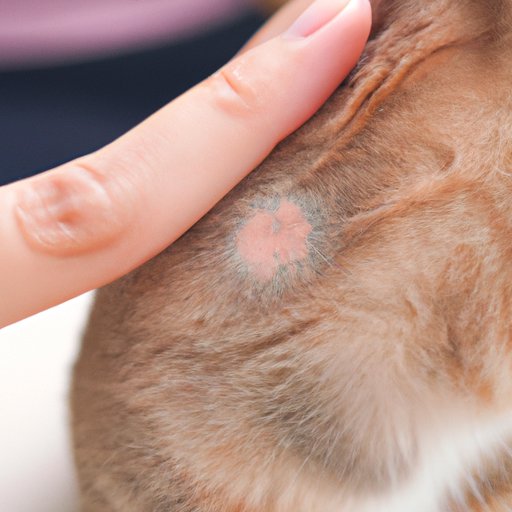Introduction
Cats are susceptible to a variety of illnesses and conditions, including ear mites. Ear mites are tiny parasites that live and feed on the wax and oils inside a cat’s ears. These mites can cause irritation, inflammation, and even permanent damage if left untreated. It is important to be aware of the signs and symptoms of ear mites in cats, as well as the available treatments and preventative measures.
This article will explore how cats get ear mites, the symptoms and causes, the treatments and preventative measures, and the potential dangers of leaving ear mites untreated. We will also discuss some common home remedies for treating ear mites in cats.
Identifying Ear Mites in Cats: What to Look For and How to Treat
The first step in identifying and treating ear mites in cats is to understand the symptoms. Common symptoms of ear mites include: excessive scratching of the ears, head shaking, and brown or black discharge from the ears. The discharge may have an unpleasant odor, and it may contain blood or pus. Your cat may also experience hearing loss or balance problems.
If you suspect that your cat has ear mites, it is important to visit your veterinarian for a proper diagnosis. Your vet will use an otoscope to look into your cat’s ears and check for signs of infection, such as redness, swelling, and discharge. They may also take a sample of the discharge to test for mites.
Once your vet has diagnosed your cat with ear mites, they will recommend a treatment plan. Treatment options for ear mites in cats include over-the-counter medications, prescription medications, and home remedies. Some of the most common medications used to treat ear mites in cats are ivermectin, selamectin, and milbemycin oxime.

Understanding the Causes and Symptoms of Cat Ear Mites
Ear mites are very contagious and can be spread easily between cats. They can also be spread from cats to dogs and vice versa, so it is important to keep any pets that come in contact with each other separated while they are being treated. Common causes of cat ear mites include contact with an infected animal, exposure to contaminated bedding or furniture, and poor hygiene.
In addition to the symptoms mentioned above, cats with ear mites may also experience intense itching and pain, as well as hair loss around the ears. If left untreated, ear mites can lead to serious infections and hearing loss.

Prevention and Treatment Options for Cat Ear Mites
The best way to prevent ear mites in cats is to practice good hygiene and keep their living environment clean. This includes regularly cleaning their bedding and toys, as well as keeping them away from other animals that may be infected. Additionally, keeping your cat’s ears clean and dry can help reduce the risk of ear mites.
When it comes to treating ear mites, there are several different options available. Over-the-counter medications such as ear mite drops or sprays can be effective, but it is important to follow the instructions carefully. Prescription medications are also available, and these are usually more effective than over-the-counter medications. Finally, your vet may recommend home remedies such as olive oil or mineral oil to help soothe the affected area.
The Danger of Untreated Cat Ear Mites
Untreated ear mites can lead to a number of serious health complications, including infection and hearing loss. In some cases, the infection can spread to other parts of the body and cause additional damage. If left untreated for too long, ear mites can even cause death.
Common Home Remedies for Cat Ear Mites
In addition to over-the-counter and prescription medications, there are a few common home remedies that can be used to help treat cat ear mites. Olive oil and mineral oil are both effective at soothing the affected area and helping to loosen the debris caused by the mites. Apple cider vinegar can also be used to create a rinse that helps to flush out the mites and debris. Additionally, garlic and tea tree oil have both been found to be effective at killing the mites.

Natural Ways to Help Prevent and Treat Cat Ear Mites
In addition to the treatments mentioned above, there are also a few natural ways to help prevent and treat cat ear mites. Dietary changes, such as adding omega-3 fatty acids to your cat’s diet, can help boost their immune system and make them less susceptible to ear mites. Herbal supplements, such as echinacea and goldenseal, can also be effective at treating ear mites and reducing inflammation.
Conclusion
Cat ear mites are a common problem that can cause severe discomfort in cats. Understanding the symptoms, causes, and treatments can help pet owners take the necessary steps to prevent and treat ear mites. Over-the-counter and prescription medications, home remedies, and natural supplements are all effective at treating ear mites, but it is important to follow your veterinarian’s instructions carefully. Untreated ear mites can lead to serious health complications, so it is important to seek treatment as soon as possible.
By taking the time to learn about cat ear mites, you can help keep your feline friend healthy and happy.
(Note: Is this article not meeting your expectations? Do you have knowledge or insights to share? Unlock new opportunities and expand your reach by joining our authors team. Click Registration to join us and share your expertise with our readers.)
